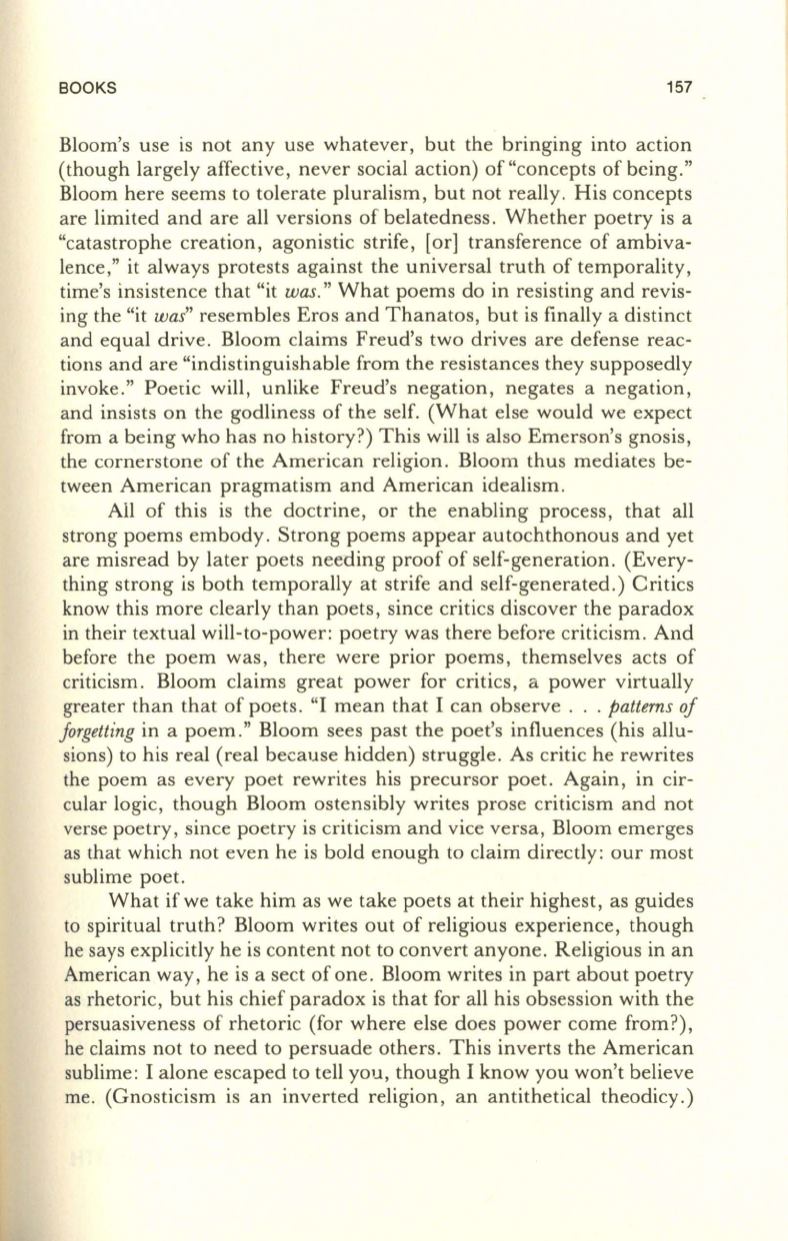
BOOKS
157
Bloom's use is not any use whatever, but the bringing into action
(though largely affective, never social action) of "concepts of being."
Bloom here seems to tolerate pluralism, but not really. His concepts
are limited and are all versions of belatedness. Whether poetry is a
"catastrophe creation, agonistic strife, [or] transference of ambiva–
lence," it always protests against the universal truth of temporality,
time's insistence that "it
was."
What poems do in resisting and revis–
ing the "it
was"
resembles Eros and Thanatos, but is finally a distinct
and equal drive. Bloom claims Freud's two drives are defense reac–
tions and are "indistinguishable from the resistances they supposedly
invoke." Poetic will, unlike Freud's negation, negates a negation,
and insists on the godliness of the self. (What else would we expect
from a being who has no history?) This will is also Emerson's gnosis,
the cornerstone of the American religion. Bloom thus mediates be–
tween American pragmatism and American idealism .
All of this is the doctrine, or the enabling process, that all
strong poems embody. Strong poems appear autochthonous and yet
are misread by later poets needing proof of self-generation. (Every–
thing strong is both temporally at strife and self-generated .) Critics
know this more clearly than poets, since critics discover the paradox
in their textual will-to-power: poetry was there before criticism. And
before the poem was, there were prior poems, themselves acts of
criticism. Bloom claims great power for critics, a power virtually
greater than that of poets. "I mean that 1 can observe ...
patterns
of
forgetting
in a poem." Bloom sees past the poet's influences (his allu–
sions) to his real (real because hidden) struggle. As critic he rewrites
the poem as every poet rewrites his precursor poet. Again, in cir–
cular logic, though Bloom ostensibly writes prose criticism and not
verse poetry, since poetry is criticism and vice versa, Bloom emerges
as that which not even he is bold enough to claim directly: our most
sublime poet.
What if we take him as we take poets at their highest, as guides
to spiritual truth? Bloom writes out of religious experience, though
he says explicitly he is content not to convert anyone. Religious in an
American way, he is a sect of one. Bloom writes in part about poetry
as rhetoric, but his chief paradox is that for all his obsession with the
persuasiveness of rhetoric (for where else does power come from?),
he claims not to need to persuade others. This inverts the American
sublime: 1 alone escaped to tell you, though 1 know you won't believe
mc. (Gnosticism is an inverted religion, an antithetical theodicy.)


